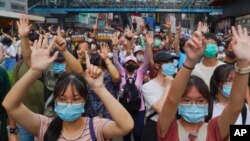Hong Kong’s government removed a national security bill from the legislature’s schedule for the rest of the year, with city Chief Executive John Lee saying the bill required more review to ensure it would be “truly effective” when implemented.
On October 7, the Legislative Council’s House Committee received an updated list of bills the government intends to bring into the legislative body in 2022. The Security Bureau’s Safeguarding National Security Bill, which was present in a previous version of the list from January, was absent from the new list.
“After passing the law, we do not want there to be loopholes that mean we have to review it again,” Lee said at an October 11 press conference. He said the government had to take more time to study the best form that these laws should take.
The bill pertained to the implementation of Article 23 of the Basic Law. The Basic Law is Hong Kong’s mini-constitution, which was established as part of the handover of Hong Kong from the United Kingdom to China in 1997 after more than 150 years of colonial rule. Under Article 23, Hong Kong must pass its own national security legislation.
Security law of 2020
Following the 2019 pro-democracy protests in Hong Kong, China introduced a new, broad National Security Law in 2020. That vaguely worded law criminalizes any acts Beijing deems as secession, subversion, terrorism or foreign collusion, with these crimes punishable by up to life in prison.
Dennis Kwok, a former member of Hong Kong’s Legislative Council and a founding member of the city’s pro-democracy Civic Party, wasn’t surprised that the bill was delayed.
“The reason why I think they are doing more research is because the scale of the amendments covers everything from cybersecurity to fake news,” he told VOA Mandarin in an interview. Kwok was among four pro-democracy legislators who were disqualified from Hong Kong’s legislature for “endangering national security” in November 2020. He left Hong Kong soon afterward.
The bill’s deferral reminded Charles Mok, also a former member of Hong Kong’s Legislative Council, of the delays to the controversial application of China’s anti-sanctions law to Hong Kong in 2021.
“Both cases were probably [a] tacit admission that the practical circumstances were not favorable to take on such controversial legislation that will invite even further indignation from the global community,” Mok wrote in an email to VOA Mandarin.
“There are enough problems on hand for Hong Kong, and the government, endorsed by Beijing no doubt, may be choosing to focus on its economic recovery from COVID and NSL,” Mok added, referring to the 2020 National Security Law. The legislation made it riskier to do business in Hong Kong, prompting some foreign companies to leave.
Ray Wong, an exiled Hong Kong activist now based in Gottingen, Germany, told VOA Mandarin he thought that delaying the bill was an attempt to preserve Hong Kong’s status as a global financial hub, which has faltered because of rising repression such as crackdowns on press freedom.
“If they push Article 23 legislation this year, it will just accelerate the deterioration and the fleeing of foreign investment out of Hong Kong,” Wong, the chair of the Germany-based Freedom for Hong Kong Association, told VOA Mandarin in an interview. But he said it was unlikely that delaying the bill would save the city’s reputation.
The spokesperson for Hong Kong’s Security Bureau told VOA Mandarin that Hong Kong’s government has a constitutional responsibility to enact legislation "relevant to safeguarding national security."
"The HKSAR Government will continue to actively press ahead the legislative exercise to implement Article 23 of the BL, with a view to drawing up effective and pragmatic proposals, and conduct public consultation at a suitable juncture," the spokesperson added, without going into specifics on the Safeguarding National Security Bill. The spokesperson used the abbreviation for Hong Kong’s official name, the Hong Kong Special Administrative Region of the People's Republic of China.
This bill will eventually be reintroduced, analysts told VOA, with some estimating that it will be reintroduced in early to mid-2023.
Little effect seen
To Kwok, now a partner at the New York City law firm Elliott, Kwok, Levine & Jaroslaw, the 2020 National Security Law already has caused so much damage to Hong Kong that additional national security legislation will not have much of an impact.
“The National Security Law already in place is already so all-encompassing. I actually don’t understand why they need another set of laws,” Kwok told VOA in an interview. “It really doesn’t mean anything to the people living in Hong Kong because the NSL is repressive enough that it has already changed Hong Kong society beyond recognition.”
It’s just a matter of time before national security legislation targets what remains of internet freedom in Hong Kong, according to Wong, who is also on the advisory board of Hong Kong Watch, a human rights organization. “This delay will probably postpone the elimination of internet freedom in Hong Kong,” he noted.
Regardless of what happens with this national security bill, Mok said the government would likely continue repressing the population through other legislation. “Most of the rest of the agenda can serve similar aims to stifle dissent,” he wrote. “So, the government will be kept busy anyway.”















